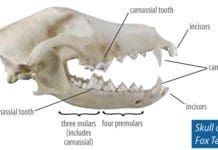How to Introduce a Cat to a Dog
There are millions of homes where cats and dogs live together in perfect harmony – mine included. How does that happen? Careful introductions of...
Why Do Dogs Howl?
Howling is one of the many ways that dogs communicate. It can be a territorial declaration, signal excitement at the start of a walk. or just communicating with dogs in the area.
Do Dogs Have Periods?
Do female dogs have periods? No, dogs do not have periods. During one stage of the dog's reproductive cycle there is a bloody vaginal discharge that superficially resembles a period.
Why Do Dogs Roll on Their Backs?
Dogs rolling on their backs is adorable. Repeated rolling though can be a sign of excessive itchiness that might need veterinary care. Dogs also have a habit of rolling in things their owner's might not care to smell or wash out of their fur.
Genetic Health Screening for Dogs
While most owners are familiar with genetic tests to determine the ancestry of mixed-breed dogs, many are not aware that a number of companies have expanded into testing for genetic health disorders. The companies typically advertise these tests as having the potential to both save money and heartache by giving owners an opportunity to prevent or detect diseases in their earliest stages, in order to add health-filled years to our beloved canine companions' lives. But is this rosy promise even possible?
Dogs vs. Wolves
This excerpt is the first chapter of Dog Smart, a new book by Linda Case, MS, founder and head trainer at AutumnGold Dog Training Center in Mahomet, Illinois, and the author of a number of books on training and animal nutrition. Case also taught at the University of Illinois Department of Animal Sciences and College of Veterinary Medicine for 20 years.
Dog DNA Tests: Mixed Results
While some of the early mixed-breed identification tests used a blood sample, all of the products on the market today extract DNA from cells swabbed by the dog's owner from the inside of the dog's cheek. The swab is sealed in a container provided by the company and mailed off to the company's lab. There, technicians extract your dog's DNA from the swab, and use computers to identify and compare specific bits of it to bits taken from dogs of known lineage.
Fulfill Your Dog’s Ancestral Calling with Job-Specific Activities
where the dogs helped with herding dairy cattle
Is Our Dogs’ Behavior Genetic?
We can prioritize giving dogs as solid a genetic background as possible. Temperament should be the highest priority in breeding, closely followed by physical health. Animals with questionable temperaments should not be allowed to pass on behavioral problems, either through their genes, through stress hormones in the uterus, or through modeling fearful behavior to their puppies in early life. Temperament is more important than preserving stellar conformation or spectacular performance; in fact, in breeds with small gene pools, bringing in genetic diversity from outside the breed is preferable to breeding dogs with questionable temperaments.
Your Dog’s Physical Characteristics (And Why They Matter)
if you are aware of them before your dog suffers an injury. For example
Wolves, Dogs, Differ in Ability to Digest Starches
Study finds genetic differences between dogs and wolves, with dietary implications. Domestication appears to have led to genetic changes in dogs that make them able to digest starches better than wolves can, according to a paper published in Nature in January.
Going Big
It’s incumbent on owners to make sure their large and giant breed dogs are especially well-trained, well-behaved, and well-socialized.

















